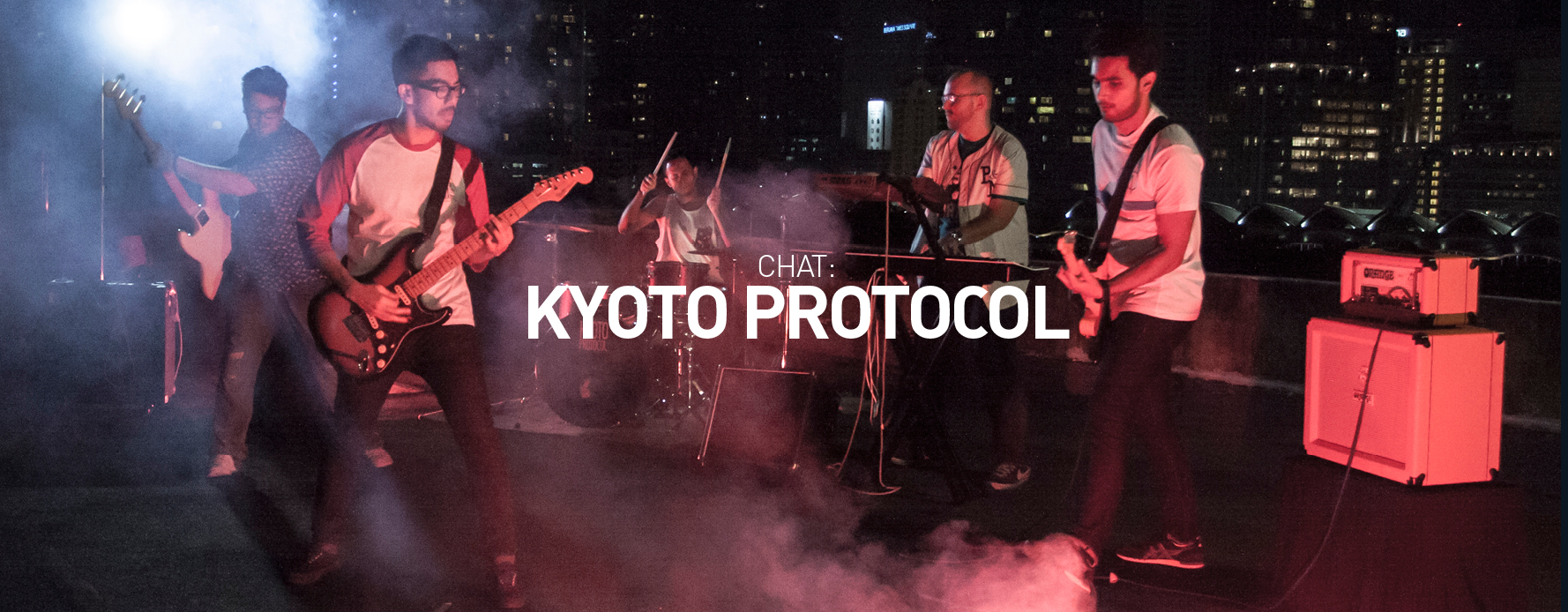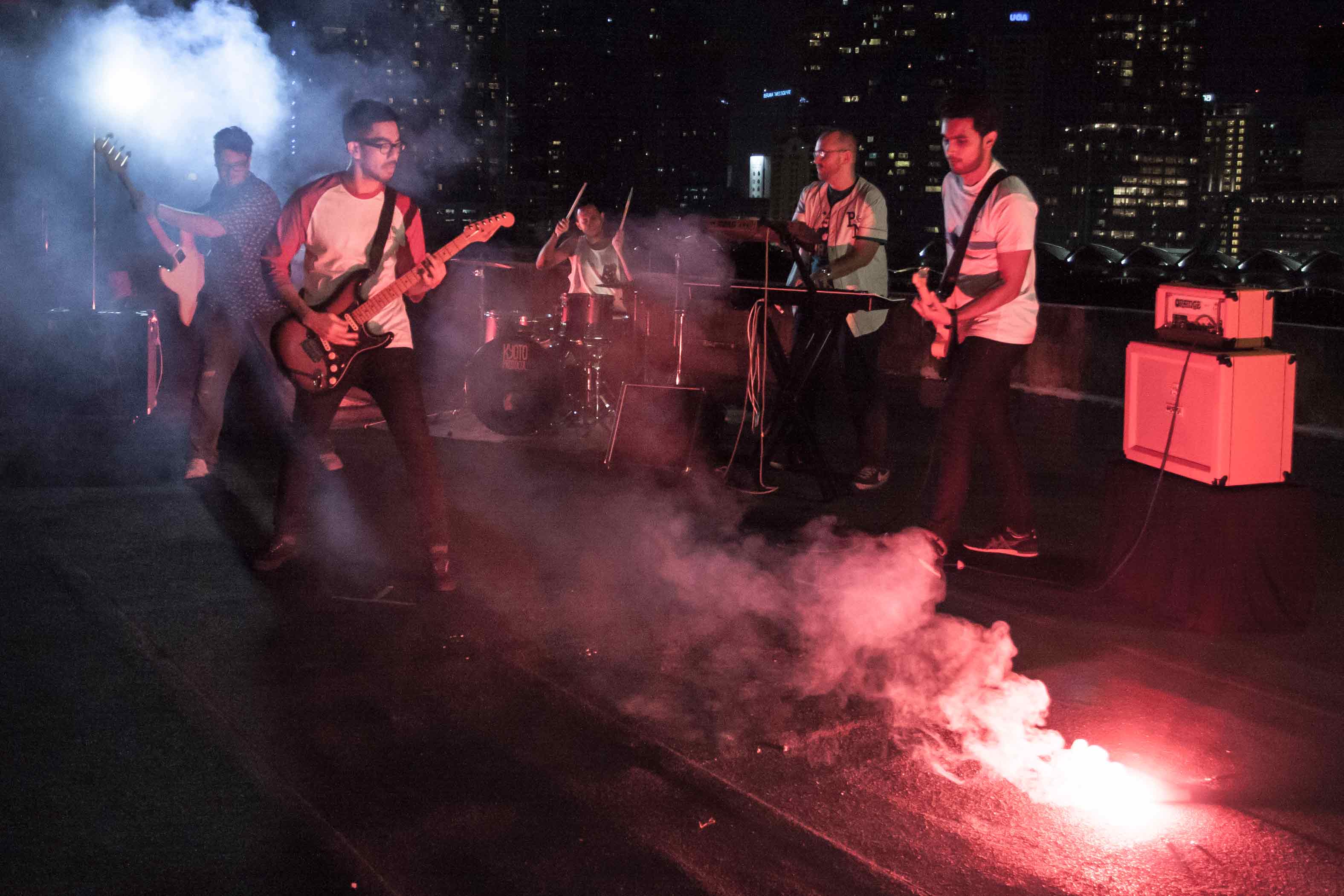Kyoto Protocol: Serious Fun
 Thirsty for JUICE content? Quench your cravings on our Instagram, TikTok and WhatsApp
Thirsty for JUICE content? Quench your cravings on our Instagram, TikTok and WhatsApp

This quintet is arguably one of the most recognised local acts playing today: They’ve started out in cover bands, entered a reality competition show, and have seemingly become one of the favourite selections as the opening band for international artistes such as MGMT, The Killers, and most recently, Tenacious D. Kyoto Protocol is the rare kind of Malaysian band that manages to imprint themselves into our minds as genuine rockstars seeping with both personality and real stage presence without seeming contrived. However, despite an innate likeability, the band has always had a sense of thoughtfulness that went unnoticed by most. As their identity is more multifaceted than just “that fun rock band at local festivals”, they’ve appointed this moment in their career to reveal more pronouncedly that facet of themselves in the only medium that matters – full-length album Catch These Men. JUICE chatted with three of the members, Fuad Alhabshi, Gael Oliveres and Shakeil Bashir, about their first full-length album, balancing the band’s image, and of course, pornographic word play.
Have you guys read our review of Catch These Men? It’s received flak since being published. What did you make of it though?
Gael Oliveres Honestly? Like personally, he has every right to his own opinion and that’s fair. And that’s what he’s supposed to do, to critique the album from his point of view. But I feel, maybe he didn’t understand what we were trying to do and maybe if [he understood]… he’ll support [the album]. He was supposed to critique the album without any bias but if he had sat down with us and talked to us, and heard out the process with what we were trying to do, I think he would have written a different article. So, he’s got every right to say what he wanted to say. The good parts, I agreed with; the bad parts, I felt they were a shame. That’s it-lah.
Shakeil Bashir It was his opinion.
What did you guys think of the Foo Fighters comparison?
Fuad Alhabshi Well, I don’t know. I think we’ll always gonna get it. I don’t think it’s always [well-] founded, really, because actually, I would say that this album has a lot of varied influences.
Such as?
F Well for ‘Dispensable’, I think a lot of is actually more Nirvana than it was Foo Fighters. I guess, you know, [if] you aimed for Nirvana and you missed, you’d get Foo Fighters, right? That’s how close they are to each other. Like the rest of the album… I don’t know. It just felt really organic. It never really felt we were gonna do one song like this, the other song like that. It was really putting the feelings to the music or the music with the lyrics, whichever one that came first. It’s really organic. We didn’t really have any direction in a sense but in the end, the collection of songs then gave us a kind of direction.
Why did it take seven years to write a debut LP?
F I don’t know if it really took seven years. It was just really there. Some songs didn’t make it onto the album. We’ve written some songs recently and we always really wanted to release those songs anyway and perhaps maybe, for better or for worse, it got in the way. I like to think it was for the better actually. So now we have a much bigger platform for the listeners to enjoy what we have. So yeah, this is just what happens. And we’re not full time; that’s the reality of Malaysia.
G And I think we wanted to make sure that the songs fit together. There are songs that we have [that] we didn’t even put on this album. Because it didn’t fit in with the overall theme and it wouldn’t have fit on the first album (An Album EP) either. It was this collection of nine songs to tell the story together, and that’s exactly why we kept until now.
Here’s a bit of an awkward question: We are curious about the album titles, An Album, Catch These Men, because if you look at them long enough they’ll read like ‘anal bum’ and ‘catch these men’…
G That’s because you have a dirty mind.
S What?! Oh that’s horrible! Are you sh!tting me? Aiyoyo…
F I would say get your mind out of the gutter!
Was the word play intentional?
All Noooo.
S We wanted people to watch our shows. Yeah, catch the show.
F Catch these men.
S Man, you just played the album dirty, I can’t believe it.
G Shak’s never gonna be the same anymore.
F He was an innocent boy before this interview.
You guys are very vivacious and entertaining to watch live and you guys don’t take yourselves seriously either, but the lyrical content of the songs are often serious. How do you guys find that balance with the band’s persona?
S When you’re not around, we’re all seriousness because we’re serious all the time (laughs).
F We’re all seriousness? (Laughs) What the hell does that mean?
S Apparently, I need to learn English as well.
F No, I think we’ve always wanted to… actually, even in the beginning, the songs were serious-ish. It’s just that the intent was to kind of package them in this fun and friendly package. Yeah, even like ‘Pussycat’, it sounds like a super fun song, or even like ‘KL I Love You’ – it’s the perfect example of what we’re trying to do, like the song sounds fun and all that but actually, in our jest, there is a serious question behind it, you know. Like, do you really you want to stay in a KL that’s like this or do you want to be a part of the difference? Do you wanna be a part of the perpetuity or do you wanna be a part of the change? So that’s the question we ask behind ‘KL I Love You’. I get that maybe it’s a bit too hidden inside, so like, we thought people would figure it out.
But they don’t seem to?
F No, not really. I think some people do.
G Some people do. It’s the ones that really wanna, try to pay attention; try to get it and actually get it. But I think personally, our personalities are very eclectic and that’s what showed up on stage. We all deal with serious issues, we all work, we all have day jobs; we all deal with bosses, with bills, with salaries, and with responsibilities. But we’re able to laugh; have a good laugh about life. And we don’t wanna go on stage and be all emo, like (cries), because that’s not who we are. We’re fun. Personally, we go out, we hang out, we have fun. We’re the noisiest people at the mamak sometimes you know.
S Empty mamak, especially.
F It’s like stand-up comedy, like it’s all fun and games but at the heart of it, there’s a real problem behind it. One of the solutions is laughter, and people kind of being aware of it.
Do you guys think that the band’s on-stage persona is a major appeal to people?
F Yeah, I think so. To be honest right, we’re not very good looking.
G Well, I think Shak’s appeal is the only appeal in the band. Look at his face!
F Yeah! I mean, it’s really one of those things, if you don’t have one attribute, you got to make it up somehow, you know.
S That’s why everybody laughs.
But Shak does have that Seth Rogen-esque vibe… wait, are you offended by that?
S No, no. Does Seth Rogen… do people find him attractive?
G (Laughs)
We guess, if people like that ‘Funny Guy’ thing. He slimmed down at least.
S Yeah, but I haven’t!
G, F (Laughs)
S Somebody said to me once, “You look like Seth Rogen back in the day.” I’m like, “Ouch.”
G, F (Laughs)
S That’s what you do: Laugh-lah! No point crying. I might write a song about you, (starts to sing “I was called Seth Rogen back in the day”).
Very Barenaked Ladies.
All (Laughs)

Seeing that you guys tour a lot and seem to be the favourite choice as the opener of many international acts, is there a pressure to always keep the sets interesting, for instance, the opening medley during the Tenacious D show?
F Yeah, behind the scenes there’s a lot of pressure for us to kind of keep it fresh you know? Like we knew we couldn’t go onto the same stage as Tenacious D and try to do, you know, our usual spiel.
Why not?
F Because that’s not what the people were there to do. We were hired as an opening band to entertain and we had to have a good think about it: “Who are the people attending that show?” It’s people who are fans of Tenacious D. “What would fans of Tenacious D want?” Something funny.
S Something fun.
F Something fun and funny, and not something serious. Our music is a balance between the fun and the serious, but we decided to do something that was a bit more fun.
S Actually, it stuck to our roots in a way as well, because we started playing in cover bands a long time ago.
F Yeah, that’s how we started.
S It was sort of like a breath of fresh air as well for us; nostalgic. We just weren’t very good back then, still not very good now.
F When we’re asked to be the opening band, we wanna have our own identity. But, sometimes we gotta have to do [it differently]… I guess in the end, no one really expected it. So, we always aim to surprise in a nice way.
G I think some people might say “Oh, it’s a cop out. You could have stamped your identity and do whatever you wanted.” But I think we really did. This is who we are. We don’t do this for us, we do this because we love it, we love playing music and we love entertaining. That’s what we were asked to do. To be fair, how many people have seen us play in that crowd? How many KLites has seen us play before? Maybe a bunch, they know our songs. Why should we shove it down their throats again and again? Like this is a chance for Tenacious D, for us, to do our thing and be a bit different. And the number of people that never heard of us, I know there were people from Hong Kong [and] Singapore who came up to us and say, “Wow, I’ve never seen that.” Like, usually bands go there and do their own thing. But that was so much fun, like thank you, thank you. And now they know who we are because we made them laugh, we made them smile, we made them sing-along. But, that’s still us.
We’ve read that with this new album, you guys are hoping to show a different side of yourselves on stage? What did you guys mean by that?
F I think to put it really simply, is that we have slow songs on this album and no one really expects Kyoto Protocol to do a slow song. But I think we are capable of doing that and I suppose that’s really a totally different side because what we have been discussing this whole time was how were we gonna balance that fine line between being fun and being serious? These are more, I would say, issues that are more personal but everybody can relate to. Like loss; loss of a loved one, loss of family, you know. So, that’s all some stuff that we…
S … seriously emotional.
Speaking of range, there’s the ballad ‘Now You’re Gone’, the vulnerability is not something we’re used to. Why did you guys choose this moment to do so?
S We don’t limit ourselves to what we write.
F Yeah, actually that song was written quite long ago.
G Yeah, not now. It just happens to fit this album, that’s why it’s coming out now.
F The song was written in… 2007? 2006?
G And we played it before. We played it in Penang. It’s not something we played all the time, it’s not a song that people knew but it was time for it to come out. It fit into the album. And to be fair, people know us [from the] five songs on An Album and they know us from what happened in Versus and [the resulting EP] Pahlawan. But, we were limited to five songs. We couldn’t show the whole range, now it’s the first time we could show our range and show what we can do. Yes, we are still that energetic band, yes, we still have that power behind the music, but we can also tone it down. And we can talk about other issues that we haven’t talked about in the past. I think it’s a natural evolution of music.
F You see, albums back in the ‘90s, they used to have that. They used to have fast songs, slow songs, and stuff like that, whereas maybe nowadays they tend to be homogenised to whatever market they are trying to hit or whatever because it’s all about marketability, right? So, like even all these punk bands, they are like literally, (mimics drums thrashing), one note, but we grew up in an age where bands would do different things on one album and that’s just us exercising what we’ve learned, either subliminally or consciously.
How was it working with Faiz Fadzil again on this album?
F He really brings us to another level because he is not just a guy who presses record and you know, let you do your thing.
S He made us go upstairs.
All (Laughs).
F Another level, yeah (laughs).
Because it said the album was ‘expertly guided’…
F Oh, because even though we only had Faiz Fadzil on as like a…
S Engineer.
F But he still offers us his insight into [music-making]… because he has a lot of experience: Worked in the US – working in Kings Studio and all that. He really did make us dig deep and get the emotion out there. He was the one who challenged us to record live as well, which we think has produced some of our best works so far. Like in terms of recording-wise, ‘Dispensable’ is an absolute monster of a sound, ‘Monster’s Ball’ is also up there, compared to stuff like say, I would say that the first album, An Album, wasn’t recorded that well in my opinion, and this time it was recorded much, much better. [It was] because of him, definitely.
Kyoto Protocol debut full-length album Catch These Men is out now.


 Get Audio+
Get Audio+ Hot FM
Hot FM Kool 101
Kool 101 Eight FM
Eight FM Fly FM
Fly FM Molek FM
Molek FM